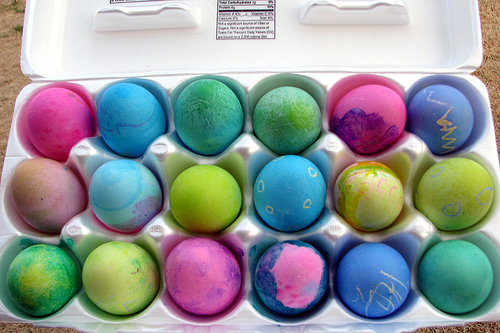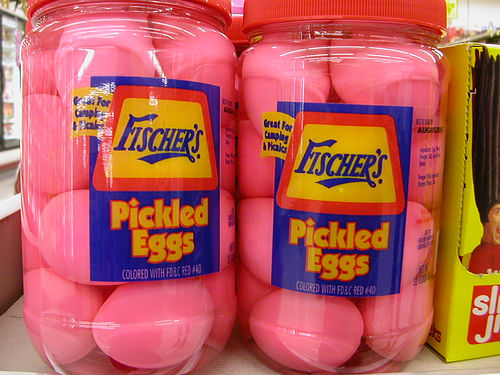How to hard boil eggs - and four things to do with them

Every year at Easter, many families buy enormous amounts of eggs. For a lot of people, Easter is the only time of year when they buy eggs in those triple-wide cartons of 18 eggs apiece, or even in the giant open cardboard flats.
First, a word of caution. Eggs should always be kept refrigerated, even after they have been hard boiled. Eggs should be refrigerated within two hours of being boiled. Assuming they have been kept properly in the refrigerator, hard boiled eggs should be used within a week.
However, if you handle them properly, it IS safe to eat Easter eggs that you have hidden for the kids to find. The USDA's Food Safety and Inspection Service says that if you keep them in the fridge until just before the hunt, and they are left out at room temperature for no more than two hours, then the eggs are still safe.

Image courtesy Flickr/Care_SMC
This does mean that you shouldn't eat eggs that you have hidden the night before. Nor should you eat any eggs that get found later in the day (or week… or, as once happened at my house, a year later).
How to hard boil eggs
I have chickens, so I eat a lot of eggs. Having performed numerous experiments, I have determined that the best way to hard boil eggs is using the method laid out by Simply Recipes:
- Put the eggs in the pan and cover them with about two inches of cold water, plus a generous amount of salt.
- Bring the water up to a full boil and let it boil for about a minute.
- Cover the pan, take it off the heat, and let it sit for 12 minutes.
- Run cold water over the eggs to chill them as quickly as possible.
This is a foolproof method that gives you perfect hard boiled eggs without over-cooking them. (Over-cooking is what makes the egg yolks turn green. It's not harmful, but it is kind of a turn-off.)
Once you have dyed, hidden and collected all your eggs, then what?
1. Egg salad
Sure, egg salad is the obvious choice. And deservedly so; it's easy, filling, delicious and can be made with ingredients (like mustard and mayo) that you probably already have in your pantry.
But there is no need for it to be boring. Consider giving it a little extra "zazz" with sriracha sauce, capers, fresh herbs (especially dill), celery, and other delicious additions.
Incidentally, to make an egg salad sandwich, you should always layer lettuce in between the egg salad filling and the slices of bread. That way your bread doesn't get soggy and gross.
2. Scotch eggs
To make these delicious cholesterol bombs, wrap a hardboiled egg in sausage, bread it, and deep fry it. You can also bake them if you want fewer calories and are some kind of spoil sport about it (or don't happen to own a deep fryer).

Image courtesy Flickr/fortune cookie
3. Pickled eggs
This is kind of an old-timey food, and one which is associated with bars. (There is a jar of pickled eggs on the counter at Moe's Tavern, if my memory serves me.) Pickled eggs are traditionally pickled with some beet juice, to give them a characteristic bright red color.
These are refrigerator pickles, which means that they are very easy to make, since you don't have to go through a hot water bath canning procedure. You just mix up all the ingredients, pop them in a jar, and refrigerate it. But the down side is that the jar has to remain refrigerated, and they won't last more than a few weeks before they start going "off."
Once again, Simply Recipes is the best resource for pickled egg recipes. This page offers recipes for curried, jalapeno, and tarragon pickled eggs. Delicious!
4. Eggs Jeanette
If you feel like going the extra mile, and you want to try something unusual, famed French chef Jacques Pepin's mother used to make a stuffed egg recipe that he christened "Eggs Jeanette."
The egg yolks are removed, blended, and stuffed back in (as for the classic deviled egg). Then the eggs are lightly browned in a skillet, and covered with an interesting dressing. Sounds delicious!
Main image courtesy Flickr/JoshBerglund19

0 comments